Nav view search
Navigation
Search
Ati Vishist Seva Medal Awardee List
| Sqn Ldr | Chandan Singh 3460 GD(P) | Unit : No.43 Squadron | Award Date 26 Jan 61 | Announced 26 Jan 61 | |
| Details : | 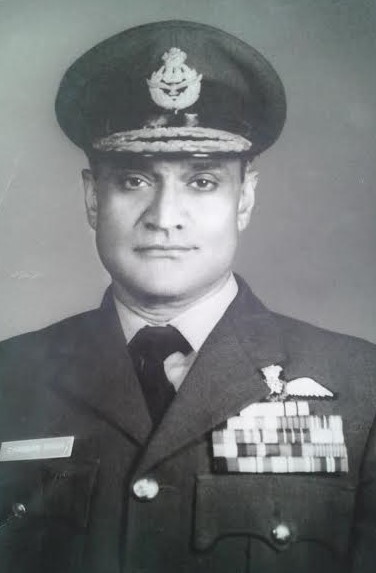 Sqn Ldr Chandan Singh was seconded from the Rajasthan State Forces to the Indian Air Force in the General Duties Branch with the rank of Flying Officer in 1946. He qualified as a service pilot in 1949. He was promoted Squadron Leader in 1957. he has devised new techniques for training young pilots in high altitude flying, and has been responsible for the selection of routes which have added to the safety of flights over hazardous mountains. He is one of our outstanding transport pilots. | ||||
| Reference: | Gazette of India Notification Dated : 26 Jan 1961 Number: | ||||
| Wg Cdr | Raizada Harbans Chawdhry 2952 AEM | Unit : -N.A.- | Award Date 26 Jan 62 | Announced 26 Jan 62 | |
| Details : | 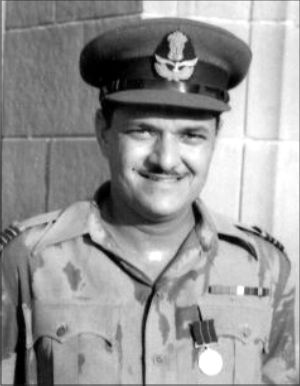 As Commanding Officer of Aircraft Manufacturing Depot since its inception, Wing Commander Chawdhry has been closely associated with the production of the first Transport aircraft manufactured in India - Avro 748. With very limited resources, inadequate tools and equipment and technical personnel untrained for manufacture of aircraft, Wing Commander Chawdhary achieved his objective by diligent planning, personal example, leadership and untiring efforts. Under his command scrapped plant, machine tools and materials were successfully reclaimed and utilized. The initiative shown and the great responsibility courageously shouldered, inspite of his comparatively junior rank, were of a high order. Wing Commander Chawdhry has displayed outstanding leadership and devotion to duty and has thus rendered distinguished service of an exceptional order in the successful production of Avro 748. | ||||
| Reference: | Gazette of India Notification Dated : 26 Jan 1962 Number: | ||||
| Wg Cdr | Suranjan Das 3175 GD(P) | Unit : -N.A.- | Award Date 26 Jan 62 | Announced 26 Jan 62 | |
| Details : | 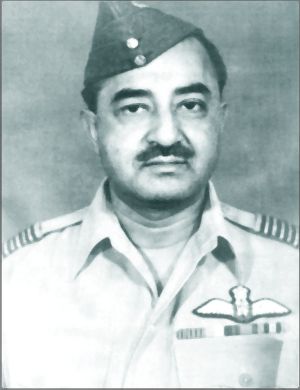 Wing Commander S. Das was nominated at short notice to undertake the first flight of the first prototype of the HF-24 Mk. 1 Aircraft. The HF-24 is designed and developed entirely in India by Hindustan Aircraft Limited. This is an aircraft in the supersonic category comparable with modern aircraft of the class manufactured by only a few countries. This aircraft embodies design features, which are entirely new and have not been tested before in powered flights. Wg. Cdr. Das, therefore, had no previous experience of this aircraft, nor was he familiar with its characteristics in the air. Inspite of this, the officer undertook its first flight on 17th June, 1961, after spending only a few days with the Members of the Design Team. Wg. Cdr. Das who has over 1,000 hours of test flying on nearly 35 different types of prototype and production aircraft has brought to bear his vast experience and knowledge in ensuring the success of the inaugural flight of HF-24. In undertaking the first successful test flight, Wg. Cdr. Das has rendered distinguished service of most exceptional order to aviation in India. This achievement calls for knowledge of a high caliber, great skill, courage and devotion to duty of an exceptional order. | ||||
| Reference: | Gazette of India Notification Dated : 26 Jan 1962 Number: | ||||
| Flt Lt | Kuppuswamy Lakshmi Narayanan 5053 GD(P) | Unit : -N.A.- | Award Date 26 Jan 62 | Announced 10 Sep 62 | |
| Details : | 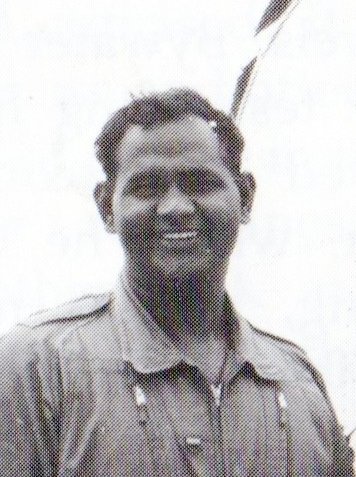 Flight Lieutenant Kuppuswamy Lakshmi Narayanan is posted as a Flight Commander to one of our helicopter flights operating in the forward areas of J & K. He has been one of the pioneers in the operation of helicopters in this region and has succeeded in landing at some of the most difficult and hazardous outposts. On 17th May 1962, an emergency call was received for immediate evacuation of a seriously ill army Jawan from one of our forward posts. In spite of unfavourable weather condition, Flight Lieutenant Narayanan ventured to penetrate the difficult territory and landed his helicopter at a spot where no other helicopter had landed before. But for this timely evacuation rendered possible by this courageous officer there would have been little chance of saving the life of the Jawan. Again on 6th August, 1962, an emergency call for the evacuation of a Havildar was received from one of our forward posts. The possibility of landing at the helipad had previously been rejected because the area was extremely small and the surrounding hills with its associated turbulence did not permit operations by helicopters. The height of this helipad was 16,000 ft. and critical approach and take off conditions left no margin for an error. However, when this request was repeated by the oupost, Flight Lieutenant Narayanan once again volunteered to carry out what seemed to be an impossible task. He was fully aware of the hazards of this particular operation but with complete disregard to his personal safety, this officer successfully evacuated the Havildar. The above mentioned actions of Flight Lieutenant Narayanan has proved beyond doubt that he has been a great asset to our forces in Ladakh area. This officer has been operating continuously for over two years and has flown 700 helicopter operational hours in this area. Throughout this period he has displayed conspicuous gallantry with complete disregard to his personal safety. By his gallant efforts he has contributed greatly to the morale of our forces in the forward area. | ||||
| Reference: | Gazette of India Notification Dated : 10 Sep 1962 Number: | ||||
| Air Cmde | Anantha Ananthanarayanan 1607 GD(P) | Unit : -N.A.- | Award Date 26 Jan 63 | Announced 26 Jan 63 | |
| Details : |  Air Commodore A.A. Narayanan was commissioned in the General Duties Branch of the Air Force in 1940. He held several important appointments in various Air Force units including an assignment in Indonesia. He was in command of our Air Force formation in Jammu & Kashmir Area from 1959 to 1962. By correct planning, with a limited number of aircraft and aircrew, he ensured the timely delivery of vital supplies to the forward areas, when air support had to be increased in magnitude with great speed to meet the Chinese attack in Ladakh. He set an example to the officers and men under his command by leading a number of difficult operational missions. | ||||
| Reference: | Gazette of India Notification Dated : 26 Jan 1963 Number: | ||||
| Wg Cdr | Lal Singh Grewal 2337 GD(P) | Unit : -N.A.- | Award Date 26 Jan 63 | Announced 26 Jan 63 | |
| Details : | 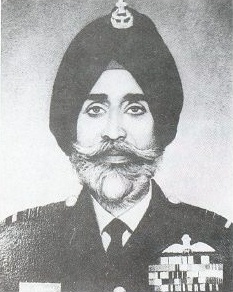 Up to June, 1960 airlift into Ladakh to enable our Army to safeguard our frontiers was sustained by a squadron of Dakotas and a few Packets operating on Detachment basis. It was appreciated that to meet the Chinese aggression, we would have to induct a very large number of troops and such induction would automatically result in enormous increase in tonnage to be airlifted. The above resources could not meet the tonnages planned to be airlifted. Therefore, it was decided to commit the whole of No.12 Packet Squadron in support of airlift operations. Wing Commander Lal Singh Grewal was given command of this Squadron in July, 1960. Prior to his arrival the Packet Squadron detachment was operating on a very limited basis i.e. carrying out a few drops and only landing at Leh Advance Landing Ground. Soon after his arrival, Wing Commander Lal Singh Grewal appreciated that carrying out these limited drops and landings only at Leh would in no way suffice in airlifting the increased tonnage required by our Army. Wing Commander Lal Singh Grewal, an exceptional pilot and an outstanding officer, knowing fully that the Packet aircraft was ordinarily designed to operate at altitudes less than 12,000 ft. calculated the risks involved in extending the use of Packet aircraft over a higher altitude and on diverse tasks which would result in considerable increase in the airlift capacity of the Packet aircraft. For this purpose, he had to consider the use of high blowers fitted in the Packet aircraft engine. These high blowers had been used to a very limited extent since the manufacture of these engines many years ago. He was of the opinion that bringing these high blowers into use would put enormous stress and strain on the other parts of the engine thereby causing engine failures. He was also aware that such engine failures over the Himalayan terrain meant serious risks of loss of life and in any case definite injury to the all crew and any passengers that may be carried in the even of a forced landing or bailing out. To safeguard the crew's life and to minimize the extent of injury that may result in case of engine failure which may lead to forced landing of the aircraft was the primary concern of Wing Commander Lal Singh Grewal. He studied many methods and came to the conclusion that safety heights must be introduced and new Emergency Landing Grounds constructed en route. In carrying out these trials Wing Commander Lal Singh Grewal was always the first to experiment on any new method or procedure. Thereby he set an example to all others and in these trials he experienced quite a few engine failures and in every case brought his aircraft safely to either an Advance Landing Ground or back to the base. Such an effort of his increased the capacity of the Packet aircraft to carry increased load as also permitting it to go on diverse tasks. Most Dropping Zones were served in the past by Dakota aircraft, and Dakota aircraft due to many limitations could only deliver at the most one ton of load on ground per sortie. Wing Commander Lal Singh Grewal's experimentation resulted in the Packets taking over practically every known Dropping Zone. Such an effort increased our capacity to build up over a wide region. Throughout Wing Commander Lal Singh Grewal has rendered service of an exceptional order. | ||||
| Reference: | Gazette of India Notification Dated : 26 Jan 1963 Number: | ||||
| Gp Capt | Kailash Chand 1754 GD(N) | Unit : -N.A.- | Award Date 26 Jan 64 | Announced 26 Jan 64 | |
| Details : |  The services of Group Captain Kailash Chand were loaned to the Government of Republic of Indonesia in 1959. On his arrival, the Minister/C-in-C AURI (Indonesian Air Force) appointed him as an adviser/member of the Auri Reorganisation Committee as well as entrusted him with the task of preparing its expansion plan. With his characteristic efficiency and foresight, Gp Capt Chand soon produced a plan well related and integrated with the reÂequipment programme of the Auri which was then changing to Russian aircraft and equipment. While devising steps to implement the plan, on of the major difficulties he faced was the inadequate training facilities in Indonesia. Gp Capt Chand along with other officers of his team set up selection organizations, established training institutions and worked out their syllabus of service and academic studies. These flourishing institutions are a tribute to his exceptional organizing ability, enthusiasm, zeal and hard work. For the highly specialized trades for which technical facilities could not be locally procured, he formulated schemes under which Auri personnel were trained in India. The training in India of over 2000 Auri personnel is an achievement of considerable significance, especially in the face of very severe rivalries of various other countries having an interest in the military setÂup of Indonesia. Gp Capt Chand and the team of officers under his able guidance progressively prepared Auri underÂstudies to take over the staff school which the IAF Advisory Group had established. This was done after all the instructional pamphlets, directives, doctrine, operational exercises and detailed manuals had been compiled and translated in Bhasa Indonesia. Apart from raising this institution to a full-fledged staff college, this officer was instrumental in setting up from scratch a Navigational School in 1962. The success of these assignments was in no small measure due to the planning ability, initiative, and leadership displayed by Gp Capt Chand. In fact, the present organisation of Auri, which is modeled on the IAF pattern, is a visible proof of the strong and perceptible influence which this officer exercised. His untiring efforts for the expansion and consolidation of the Auri were greatly appreciated by the Indonesian Government and press; and these contributions earned for the IAF the gratitude of the Indonesian authorities. The Air Agreement for technical cooperation between the Air Forces of two Asian countries was entirely a new experiment. Its success largely depended upon the skill, tact and personal leadership of the individuals who were responsible to implement it. Gp Capt Chand showed these sterling qualities in abundant measure and gained completely the confidence of the Auri. His frank and friendly approach and advice on all problems was always appreciated. His sense of dedication, tireless energy and example of hard work inspired others under his command. The existing close relations between IAF and Auri bear ample testimony to the excellent work of this Officer which has throughout been highly commended by the Indonesian authorities. Group Captain Kailash Chand has, thus, rendered distinguished service of a most exceptional order. | ||||
| Reference: | Gazette of India Notification Dated : 26 Jan 1964 Number: | ||||
| Sqn Ldr | Chandra Kant Shentaram Raje 4038 GD(P) | Unit : -N.A.- | Award Date 26 Jan 64 | Announced 26 Jan 64 | |
| Details : | 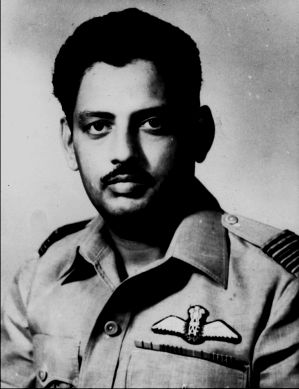 Squadron Leader Chandrakant Shantaram Raje has been operating in J & K area with transport units since 1956 and he is now on his third operational tour. He has carried out over 1000 hours on operational in J & K area. He holds a Master Green Instrument Rating and 'A' category on transport aircraft. He was one of the few pilots who flew a large number of sorties uplifting awkward and non-ejectionable loads like trucks, girders and road rollers to remote and high altitude Advance Landing Grounds like Chushul and Fukche. In October, 1961, one of our Packet aircraft had forceÂlanded at Kargil which is normally only fit for use by Dakotas. Squadron Leader Raje volunteered to retrieve this aircraft. It was an extremely difficult and hazardous task due to the very short length of runway, steep hills on all sides and having only a very narrow valley to climb after take-off. This officer displayed great skill and devotion to duty in bringing out the aircraft safely to base. In July, 1962, Squadron Leader Raje was associated with the evaluation of the Packet aircraft fitted with Jet Pack and was called upon to land and takeÂoff from the world's highest improvised landing strip at Daulet Beg Oldi, situated at an altitude of 16800 feet. He performed the task admirably. Squadron Leader Chandrakant Shantaram Raje has thus rendered distinguished service of an exceptional order. | ||||
| Reference: | Gazette of India Notification Dated : 26 Jan 1964 Number: | ||||
| Wg Cdr | Hardyal Singh Dhillon 3237 GD(P) | Unit : No.43 Squadron | Award Date 26 Jan 65 | Announced 26 Jan 65 | |
| Details : | 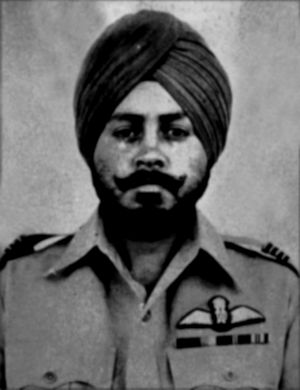 Wing Commander Hardyal Singh Dhillon has been in command of one of our operational Transport Squadrons deployed in J & K since the onset of emergency. This is his second operational tour in this area; first tenure being as a Fighter Pilot during Kashmir operations in 1948. Wg Cdr Dhillon was awarded the Vayu Sena Medal for his outstanding performance during Goa operations in 1961. Immediately on taking over the Squadron, Wg Cdr Dhillon was faced with the enormously increased task of airÂlift of vital supplies to our Army personnel employed in forward areas. In spite of the low manning level and various maintenance difficulties, Wg Cdr Dhillon faced the situation with grim determination, dauntless courage and unflinching devotion to duty. He re-organised his unit to meet the challenge with limited resources at his disposal. Having realized that in order to deliver the goods successfully Dakota aircraft of his unit will have to operate its maximum limits, he led most of the vital and hazardous missions personally and carried out 571 sorties involving more than 1000 hours in a remarkably short period of 20 months. On many days after having flown 8 hours, he had to deal with the administrative problems of his unit and could be seen supervising the servicing of his aircraft, thus ensuring proper running of the unit and a high rate of serviceability. Inspired by his personal example and devotion to duty the officers and his men cheerfully worked round the clock as a perfect team and kept and much needed supply lines for the Army open throughout the year and thus brought admiration and credit from the troops to the Service. The Squadron completed the assigned airÂlift to all the forward airfields and flew 16000 hours in spite of frequent interludes of bad weather within a period of 20 months, which is a remarkable achievement. He, by his careful planning and maintaining rigid discipline, both on the ground and in the air, kept his Squadron accidentÂfree throughout this period. In spite of the difficult living and working conditions, Wing Commander Dhillon by taking personal interest in the welfare of his officers and men successfully maintained a very high morale in the Squadron. Wing Commander Hardyal Singh Dhillon has thus rendered service of most exceptional order. | ||||
| Reference: | Gazette of India Notification Dated : 26 Jan 1965 Number: | ||||
| Sqn Ldr | Karam Singh 5132 TECH | Unit : -N.A.- | Award Date 26 Jan 65 | Announced 26 Jan 65 | |
| Details : | Squadron Leader Karam Singh was in command of one of our Repair and Salvage Units from June 1962 to March 1964. The task of the unit was to repair and salvage aircraft all over the Western Sector. In the face of such extreme difficulties as inaccessible areas of operations, difficult terrain, adverse weather condition and shortage of manpower, the officer carried out his duties in an exemplary manner during the period of his Command. The following two examples highlight the commendable efforts put in by this officer in the discharge of his arduous duties:Â During, the period Decembar, 1962/ January, 1963, the officer was called upon by Western Air Command to carry out extensive repairs to a crashed aircraft C-130 of the United States Air Force engaged in airlifting operations for our defence forces at Leh. Despite the nonÂavailability of standard repair schemes, specialist advice or adequate maintenance facilities, this officer, leading a handful of men, successfully carried out major repairs to the aircraft, at the scene of the crash, under most arduous working conditions at subÂzero temperature. In September, 1963 he was called upon to undertake major repairs to an IAF aircraft ANÂ12 which had suffered extensive damage at an advanced airstrip in the J&K. Despite the nonÂavailability of proper materials, test equipment and schemes for repair he led his men and carried out the repairs in the shortest time possible. He displayed a high degree of professional skill, praiseworthy qualities of leadership and perseverance in the face of almost insurmountable difficulties. All these were collectively responsible for the successful completion of the task. Squadron Leader Karam Singh has thus rendered valuable service of an exceptional order, which is in keeping with the highest traditions of the Indian Air Force. | ||||
| Reference: | Gazette of India Notification Dated : 26 Jan 1965 Number: | ||||
| Wg Cdr | Krishna Dandapani 3583 GD(P) | Unit : 230 Signal Unit | Award Date 01 Jan 66 | Announced 01 Jan 66 | |
| Details : | 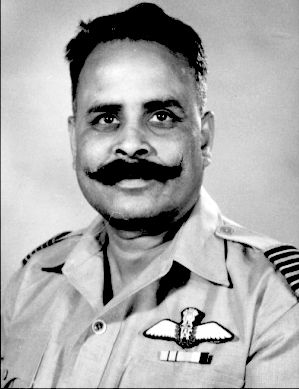 As the Commanding Officer of Signals Unit, located near Amritsar, Wing Commander Krishna Dandapani found himself in the thick of the fight from the moment the original infiltration into Jammu and Kashmir escalated into full-fledged war with the onrush of Pak armour into Chhamb. The only installation which could monitor air activity over Pakistan and the battle area, it became Wg Cdr Dandapani's task to muster the meager resources of men and spares which he had at the time and keep the unit working day and night without any break. He organised his unit to work as a closely knit team and gave timely warnings of Pakistani air intrusions into Indian air space. The Pakistan Air Force, which was fully aware of the immense value of this unit to our Air Force, sent over wave after wave of bombers and fighters by day and by night to bomb and strafe the installation and put it our of commission. Whatever damage was caused to it was immediately repaired and the unit went on the air in a matter of hours. When the original site became known to the enemy and became untenable owing to his raids, Wg Cdr Dandapani and his men moved it under cover of darkness to an alternative site and resumed their work of monitoring the enemy air activities and warning our aircraft of the presence of enemy aircraft in the battle area and their likely intention. Short of competent Controllers, he himself directed our aircraft most of the time to intercept the enemy before he reached our front line positions and warned our fighters of his reinforcements in the air so that they could disengage themselves from the enemy before they were outnumbered. Wing Commander Dandapani's unremitting efforts at keeping the unit serviceable at all times despite the enemy's ceaseless bombing and strafing inspired his colleagues and subordinates to a high pitch of selflessness and efficiency. By his ceaseless efforts, his undiminished enthusiasm and tough moral fibre, he ensured the uninterrupted functioning of the unit which was one of the most valuable parts in our air defence system. | ||||
| Reference: | Gazette of India Notification Dated : 01 Jan 1966 Number: | ||||
| Sqn Ldr | Bawa Prithipal Singh 4051 SIG | Unit : -N.A.- | Award Date 01 Jan 66 | Announced 01 Jan 66 | |
| Details : | 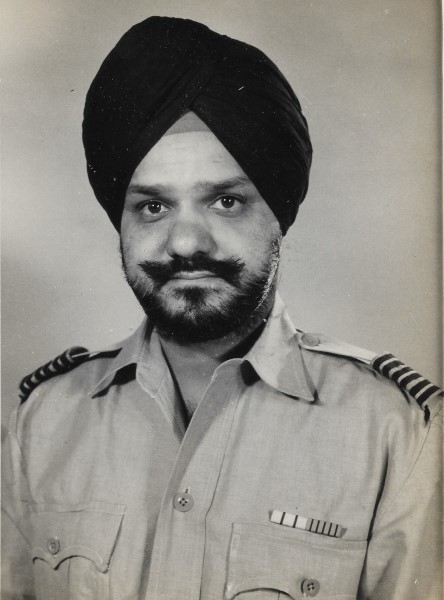 During the Pakistani aggression in September, 1965, a Signals unit commanded by Squadron Leader Bawa Pritpal Singh had been instrumental in giving early warning of enemy air raids in the Jammu region. Despite threats of shelling and many air raids, this signals unit had been functioning round the clock with commendable efficiency. On many occasions this unit alerted Amritsar, Pathankot and Ambala about the approach of enemy aircraft from this area towards them. The unit also alerted the air defence systems when slow moving enemy aircraft were detected flying in this sector. Such enemy aircraft could be expected to drop paratroops in our territory near the vital positions. Through perseverance and personal supervision and guidance Sqn Ldr Singh made it possible to work the old radar equipment of the S.U. for more than 19 hours a day. The vigilance was without any breakdown during the entire period of the operations. The leadership, technical skill and devotion to duty displayed by Sqn Ldr Singh has been of very high order and is in keeping with highest traditions of the Indian Air Force. | ||||
| Reference: | Gazette of India Notification Dated : 01 Jan 1966 Number: | ||||
| Sqn Ldr | Lakhmir Singh 4941 SIG | Unit : 230 Signal Unit | Award Date 01 Jan 66 | Announced 01 Jan 66 | |
| Details : | 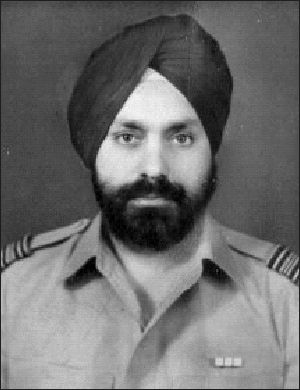 Squadron Leader Lakhmir Singh the Signals officer of one of our radar stations near the IndoÂPak border was charged with the responsibility of maintaining the radar unit at a high state of serviceability. His tasks during the period of operations between 5th August and 23rd September required not only a high degree of technical knowledge but a good deal of resourcefulness and skill at improvisation. His stock of spares was meager; the unit was under constant bombing and strafing attacks by Pakistani bombers and fighters. In one such attack the aerial system was put out of commission. To get another aerial to replace the damaged one would have involved a delay of days, so Sqn Ldr Lakhmir Singh set about repairing the system on the spot which he was able to do in day. The location of the unit having become known, the enemy efforts to destroy it and thus deprive us of our ability to keep track of his activity, increased. To prevent the unit from being permanently put out, Sqn Ldr Lakhmir Singh had to survey another site to which the unit could be moved. The move had to begin and complete at night so that the enemy would be ignorant about its new location and the unit would go on the air again by the morning. This was accomplished and the unit continued to give efficient cover in its new location until cease fire. Throughout the period of operations, Sqn Ldr Lakhmir Singh displayed a high sense of duty, resourcefulness and skill. His ceaseless effort to keep the unit functioning at full efficiency was an example which his subordinate emulated. | ||||
| Reference: | Gazette of India Notification Dated : 01 Jan 1966 Number: | ||||
| Air Cmde | Keki Nadirshah Gocal 1764 GD(P) | Unit : Western Air Command | Award Date 26 Jan 66 | Announced 26 Jan 66 | |
| Details : |  Air Commodore Keki Nadirshah Gocal has been Senior Air Staff, Officer of Headquarters Western Air Command since 30th December 1963. A competent pilot, who is at home in almost all the type of aircraft in that Command, be they fighters, bombers, transport or helicopters, he has applied his knowledge of the aircraft and their performance to good effect in the preparation of operational plans. When hostilities between India and Pakistan broke out, the task of preparing operational plans based on the general directive of Air Headquarters fell on Air Commodore Gocal. Allocation of targets to the fighters, fighter bombers involved a thorough study of the radius of action, take off distance with different war loads in the sharply varying temperatures, the type of weapon appropriate for the destruction of the target, the amount of fuel to be carried with the particular configuration and the sortie profile in respect of the different types of aircraft employed. His duties also involved the coordination of the effort of the technical and armament staff in working out the deployment of squadrons to bases to achieve the best results. Short of hand, Gocal had to work long hours without any rest and be available for advice to the Unit Commanders. He took on all the tasks cheerfully. By making frequent and unscheduled visits to the frontline units during the operations he ensured the smooth functioning and efficient performance of the squadrons. Air Commodore Gocal has set a very good example of selfless dedication to duty and rendered distinguished service of the most exceptional order. | ||||
| Reference: | Gazette of India Notification Dated : 26 Jan 1966 Number: | ||||
| Air Cmde | Victor Srihari 1624 GD(P) | Unit : AFS Jodhpur | Award Date 26 Jan 66 | Announced 26 Jan 66 | |
| Details : | 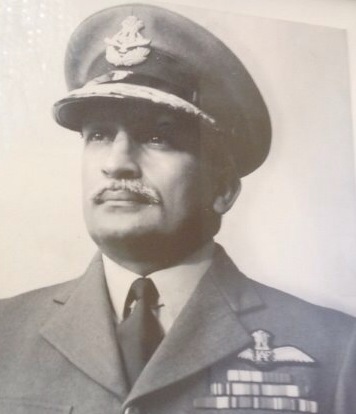 Air Commodore Victor Srihari as the Commandant of the Air force Flying College, Jodhpur was personally responsible for all air operations undertaken from this airfield during the fighting against Pakistan in September, 1965. The Flying College is primarily meant for imparting elementary flying training to various categories of aircrew. The sudden outbreak of hostilities and the enemy air activities in the Rajasthan-Sindh sector posed an unprecedented problem for this Air Officer as his Station had neither the personnel nor the aircraft and equipment to undertake any effective air operations, particularly against aircraft of superior performance of the Pakistani Air Force. In spite of these problems, Air Commodore Srihari rose to the occasion and through constant processes of improvisation and ingenuity organised the basic nucleus of an air defence force to counter the menacing threat from the raiding Pakistani aircraft. Through personal example he encouraged the pilot instructors of the College to readjust themselves to the operational conditions in a very short time and take to the air both by day and night. As the operations progressed, the newly established operational force at Jodhpur under the command of Air Commodore Srihari started flying on missions of a diverse nature. Armed reconnaissance sorties were flown over the battle areas and into the enemy territories for provding vital information so badly required for the operations by the Army in Western Rajasthan. These armed reconnaissance missions were personally planned, controlled and managed by this Air Officer to ensure their utmost effectiveness in the face of superior enemy air potential. Fully aware of the limitation of his force he planned these operations in such manner that the frequent patrols by superior enemy aircraft could not do any effective damage to any our reconnaissance aircraft in this sector. To counter the enemy air raids over Jodhpur and the surrounding areas a fine air defence team was organized by the Air officer and this force contributed to a large extent towards reducing the effectiveness, intensity and accuracy of Pakistani bombing at Jodhpur and the surrounding areas where our army units were operating. This fighter force operated by both day and night although they had very little training for night operations. In the offensive role also, the operational team under this gallant officer inflicted damage on enemy ground targets including some helicopters in spite of very stiff opposition from the enemy. The overall contribution of Air Commodore Victor Srihari towards the air operation in Rajasthan-Sindh sector has been very commendable. | ||||
| Reference: | Gazette of India Notification Dated : 26 Jan 1966 Number: | ||||
| Gp Capt | Bal Bhagwan Marathe 1915 GD(P) | Unit : AFS Agra | Award Date 26 Jan 66 | Announced 26 Jan 66 | |
| Details : | 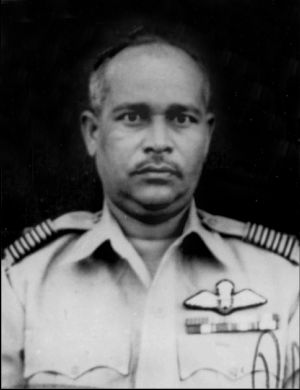 Group Captain Bal Bhagwan Marathe has been in command of one of the major flying Air Force Stations unique for the number, variety and complexity of its lodger units. As the Station Commander, he was faced with enormous problems of timely completion of operation training of the jet bomber crews and transport crews of the Indian Air Force and the abÂinitio and refresher training of the paratroops of the Indian Army. Group Captain Marathe spared neither himself nor those placed under his command in a determined roundÂtheÂclock effort to raise the flying standard of the Wing to an exemplary level of operational efficiency in providing assistance to the units engaged in the logistic support in the J&K area including Ladakh. Faced with enormous problems of acute shortage of trained personnel and equipment, Group Captain Marathe with determination, and able leadership, brought up the operational readiness of the Wing and accomplished the difficult task of training operational aircrew to a high standard of efficiency. Group Captain Marathe's skill and effort as a pilot, his leadership, administrative ability, energy, drive and devotion to duty have inspired his officers and men to an excellent professional standard, by which he has rendered services of an exceptional order. | ||||
| Reference: | Gazette of India Notification Dated : 26 Jan 1966 Number: | ||||
| Gp Capt | Trilok Nath Ghadiok 2354 GD(P) | Unit : AFS Chandigarh | Award Date 26 Jan 66 | Announced 26 Jan 66 | |
| Details : |  In December, 1962, Group Captain Trilok Nath Ghadiok assumed command of a transport wing mainly responsible for the air supply of J&K area including Leh. He set to work with commendable energy and perseverance in the face of numerous difficulties and soon brought the Wing to a high standard of efficiency in the air and on the ground. A pilot of outstanding ability, he has led a number of supply missions to forward areas, setting a very fine example to the experienced aircrew while training juniors. By energizing his men with unremitting care to the utmost effect, he ensured a high rate of aircraft serviceability. By infusing enthusiasm among his officers and men for operational efficiency, he brought the Wing to a high level of cohesive unit and combat-effectiveness. His unflagging zeal, helpful sprit, understanding and integrity have earned him excellent interservice support and coÂoperation and so this Wing has accomplished its large and varying task with unqualified success. The tonnage of supplies and equipment airlifted by this Wing between December, 1962 and May 1965 reached the admirable figure of over 73,000 tonnes. By his devotion to duty and outstanding, effort, Group Captain Ghadiok has rendered service of an exceptional order. | ||||
| Reference: | Gazette of India Notification Dated : 26 Jan 1966 Number: | ||||
| Gp Capt | David Eugene Bouche 2774 GD(P) | Unit : AFS Ambala | Award Date 26 Jan 66 | Announced 26 Jan 66 | |
| Details : | 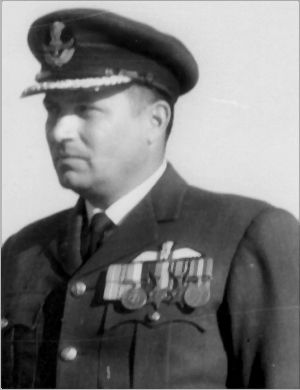 Group Captain David Eugene Bouche assumed command of the Air Force Station, Ambala at the end of January 1965. His Station was responsible for forming and training Gnat Squadrons. All the Gnat units which participated in the recent operations belonged to this station. Within a very short time of the assumption of command, he brought the Squadrons based at his Station to a high pitch of combat effectiveness despite shortages of trained personnel and equipment. An outstanding pilot himself, he imbued his pilots with and offensive spirit. During the recent Indo-Pakistan conflict, when our forward airfields were subjected enemy air attack, Group Captain Bouche organized both day and night air defense properly and used the Gnat aircraft offensively, obtaining good results. He flew many sorties, both during day and night, and himself led a quite a few formations on offensive operations. Group Captain Bouche's outstanding skill as pilot and his leadership in flying, administration and technical preparations produced a very high level of operational effectiveness of the Squadrons based on his station. He has thereby rendered distinguished service of an exceptional order during the recent operations. Group Captain Bouche's outstanding skill as a pilot and his leadership in flying, administration and technical preparations produced a very high level of operational effectiveness of the Squadrons based on his station. He has thereby rendered distinguished service of an exceptional order during the recent operations. | ||||
| Reference: | Gazette of India Notification Dated : 26 Jan 1966 Number: | ||||
| Gp Capt | Surinder Singh 3009 GD(P) | Unit : -N.A.- | Award Date 26 Jan 66 | Announced 26 Jan 66 | |
| Details : |  Group Captain Surinder Singh has been a staff officer in-charge of air operations at Headquarters Western Air Command since 17th July, 1964. A very experienced Canberra pilot and a former Canberra Squadron Commander, he was made responsible for planning bomber operations during the recent campaign. Planning of even training sorties in peace is very time consuming and complex process; planning of bomber operations in war is even more so when factors like enemy anti aircraft and fighter defences, entry into and exit from the enemy area, low level night navigational problems and war load, which are normally not come across in peace, have to be worked out in the minutest detail to ensure successful execution. Throughout the period of operations, Group Captain Surinder Singh worked hard with serious purpose; he not only planned the sorties but briefed the squadron and Flight Commanders personally. The excellent work he turned in is reflected in the unqualified success of our bomber operations. Group Captain Surinder Singh has rendered distinguished service of an exceptional order. | ||||
| Reference: | Gazette of India Notification Dated : 26 Jan 1966 Number: | ||||
| Gp Capt | Raj Kumar Singh Marya 2916 ENG | Unit : -N.A.- | Award Date 26 Jan 67 | Announced 26 Jan 67 | |
| Details : | 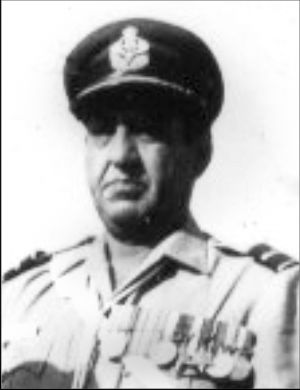 Group Captain Raj Kumar Singh Marya was commissioned in the Air Force in 1944. He has held important appointments in Air Headquarters as well as in the Command of various Air Force Units. He has attended a course of Ground Training on Hunter Aircraft in the U.K. in 1957-58. He also attended the National Defence College in 1964. He has been in command of a Base Repair Depot since January, 1965. He reorganized the Depot despite many handicaps and succeeded in raising production at a steady pace. During the conflict with Pakistan in 1965, when it was necessary to promptly replace losses in operations, this Depot, under the able guidance of Group Captain Marya, achieved a record production of aircraft and aeroengines. | ||||
| Reference: | Gazette of India Notification Dated : 26 Jan 1967 Number: | ||||
| Gp Capt | Fredrick Van Allen Scudder 2639 GD(P) | Unit : -N.A.- | Award Date 26 Jan 67 | Announced 26 Jan 67 | |
| Details : | 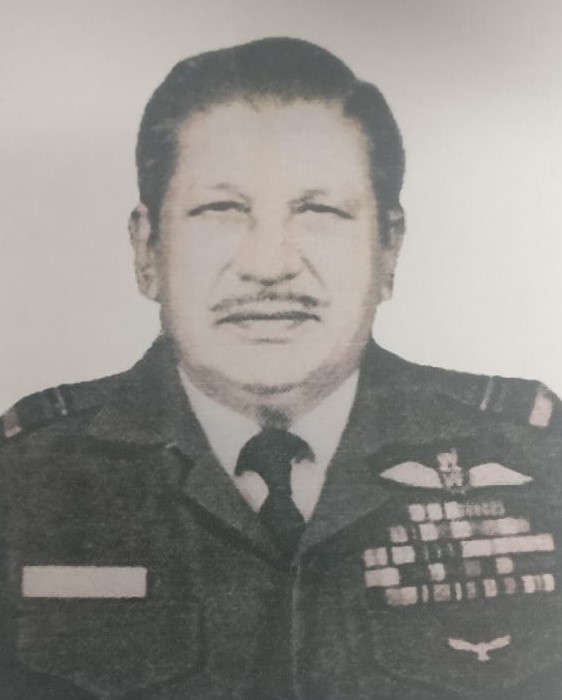 Air Commodore Frederick Van Allen Scudder was commissioned in the Indian Army in 1941 and was seconded to the Indian Air Force in 1943. He has attended the Defence Service Staff College Course at Wellington. He has attended the National Defence College Course. He has held important appointments in Air Headquarters and in various Air Force units. Soon after he took over as Director of Air Force Works at Air Headquarters in October 1962, he had to face many important problems connected with the expansion of the Air Force. By working long hours with determination, he tackled all the problems successfully and ensured completion of all tasks satisfactorily and in time. | ||||
| Reference: | Gazette of India Notification Dated : 26 Jan 1967 Number: | ||||
| Gp Capt | Jugger Singh Ram Singh 2180 GD(P) | Unit : -N.A.- | Award Date 26 Jan 67 | Announced 26 Jan 67 | |
| Details : | 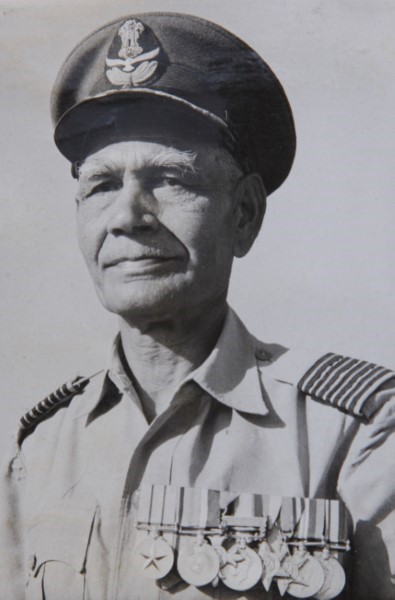 Group Captain Jai Singh Ram Singh was commissioned in the Air Force in 1943. He has held important appointments in Air Headquarters and in various Air Force units. In August, 1963, he took over the command of a Base Repair Depot and immediately set himself to the task of reorganising it with a view to increasing the output. It was due to his initiative, perseverance and resourcefulness that during the hostilities with Pakistan all the urgent demands were met within a short time. Under his able guidance, the depot carried out a number of modifications on various ground equipment for aircraft, thereby saving considerable foreign exchange. | ||||
| Reference: | Gazette of India Notification Dated : 26 Jan 1967 Number: | ||||
| Gp Capt | Krishna Mohan Ram 3101 GD(P) | Unit : -N.A.- | Award Date 26 Jan 67 | Announced 26 Jan 67 | |
| Details : | 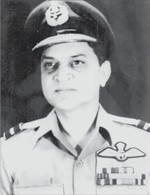 Group Captain Krishna Mohan Ram was commissioned in the Air Force in 1945. He attended the Defence Services Staff College Course at Wellington and the Flying Instructors Course in the United Kingdom. After holding various appointments in Air Force units and in Air Headquarters, he took over the appointment of Air Adviser to the Indian High Commissioner in Pakistan in July, 1964. During his tenure there, he rendered distinguished service of an exceptional order in that he had helped the Pakistan Air Force and the Indian Air Force to sort out a number of problems. | ||||
| Reference: | Gazette of India Notification Dated : 26 Jan 1967 Number: | ||||
| Wg Cdr | John Charles Plomer 3299 GD(P) | Unit : -N.A.- | Award Date 26 Jan 67 | Announced 26 Jan 67 | |
| Details : | 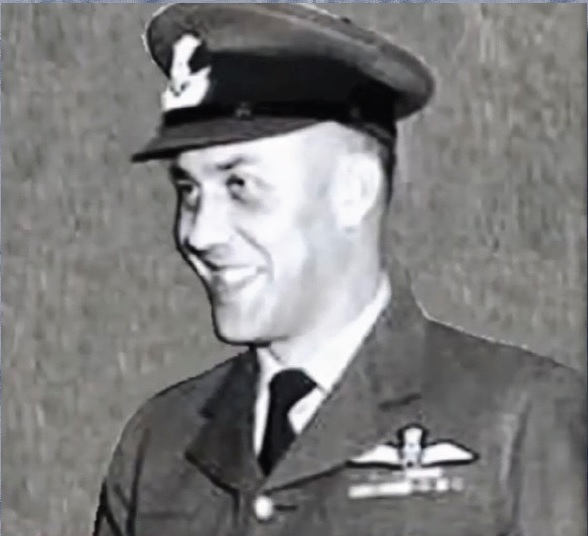 Wing Commander John Charles Plainer was commissioned in the Air Force in 1954. He has held important appointments in various Air Force Units. He attended Flying Instructors Course at F.I.S., Ambala and took training on Caribous aircraft in U.S.A. He has been commanding a newly formed transport squadron of Caribous in the eastern sector since 1963. He was faced with the tremendous task of conversion training of pilots of his squadron on the new aircraft as well as of training them for overseas ferrying duties. He himself ferried four aircraft across the North Atlantic without any previous experience. He was responsible for improving the accuracy of supply dropping on this new aircraft. He inspired his men to work round the clock and to keep the supply lines to Army and Border Roads Organisation open throughout tile year. He has retired from the Air Force in December, 1966. | ||||
| Reference: | Gazette of India Notification Dated : 26 Jan 1967 Number: | ||||
| Sqn Ldr | Rajendra Singh Bishnoi 3728 A&SD | Unit : -N.A.- | Award Date 26 Jan 67 | Announced 26 Jan 67 | |
| Details : | 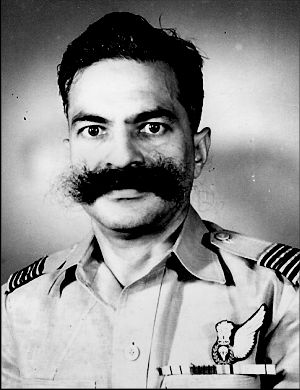 Squadron Leader Rajendra Singh Bishnoi was commissioned in the Air Force in 1950. He was Chief Instructor at the Paratroopers Training School, Indian Air Force, in 1963-64. He has to his credit a total of 265 parachute descents. In October, 1963, he led the I.A.F. parachute jumping team which was conducting for the first time trials over a dropping zone at an altitude of 13,000 feet above sea level. He was the first person to jump with an indigenous parachute and the first Indian to jump from Caribou aircraft. Throughout his tenure in the Training School, be displayed leadership and determination in carrying out live jumps at high altitudes with new parachutes from new types of aircraft. | ||||
| Reference: | Gazette of India Notification Dated : 26 Jan 1967 Number: | ||||
| Sqn Ldr | Nijram Satramdas Bhagwanani 4509 MED | Unit : -N.A.- | Award Date 26 Jan 67 | Announced 26 Jan 67 | |
| Details : |  Squadron Leader Nijram Satramdas Bhagwanani was commissioned in the Air Force in 1953. He attended many important military medical courses and held important appointments in the various Air Force Hospitals. He was selected as a member of the Indian Medical Team in Laos in September, 1965. During his tenure there, on many occasions, he has saved lives by carrying out successful operations with scanty surgical appliances and under adverse operating conditions. On 27th May, 1966, after hearing that some villages were threatened with an epidemic of diphtheria and two children had already died, Sqn. Ldr. Bhagwanani disregarding his personal comforts, went through waistÂdeep water in the night, and working nonÂstop throughout the night and the next day, was successful in immunising the entire children population of these villages, as a result of which there was no further casualty. Again, during the floods in September, 1966, in Laos, he worked day and night and rendered medical assistance to the flood-stricken people. | ||||
| Reference: | Gazette of India Notification Dated : 26 Jan 1967 Number: | ||||
| AVM | Madhukar Mallanah Shrinagesh 1665 MED | Unit : -N.A.- | Award Date 26 Jan 68 | Announced 26 Jan 68 | |
| Details : |  Air Commodore Madhukar Mallannah Shrinagesh was commissioned in January, 1940 and was seconded to the Medical Branch of Indian Air Force In January, 1941. He saw active service on the Burma Front during World War II while he was the medical officer of No.1 Squadron. He was mentioned in despatches for his commendable operational service. After Independence, till the integration of the medical services, he served as the Director of Medical Services at Air Headquarters and played a major part in shaping the medical service of the Air Force. He also served as Deputy Command and Dean of the under graduate wing of the Armed Forces Medical College, Poona. He attended Advance Aviation Medicine Course in USA in 1950-51. In 1957, he specialized in aviation medicine and was instrumental in setting up the School of Aviation Medicine at Bangalore. The reputation earned by this institution was due to the initiative, zeal, hard work and above all the high standard of professional ability of the officer. | ||||
| Reference: | Gazette of India Notification Dated : 26 Jan 1968 Number: | ||||
| AVM | Chaman Lal Mehta 1630 ADM | Unit : -N.A.- | Award Date 26 Jan 68 | Announced 26 Jan 68 | |
| Details : | 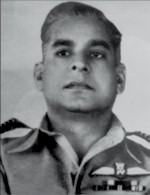 Air Commodore (now Air Vice Marshal) Chaman Lal Mehta was commissioned in the Air Force in 1940. He has held important appointments in Air Headquarters as well as in the Command of various Air Force Units. He attended the Advance Flying Training Course and Administrative and Discipline Course during 1941Â42. As Director of Personnel, Air Headquarters, he tackled many intricate problems of personnel administration. As Station Commander, Jalhali, he introduced numerous new training schemes which resulted in vastly superior output of trained personnel and in reducing the wastage rates. In his capacity as Director, Air Force Works, during the period of Chinese aggression, he, despite limited resources, completed construction of many new airfields. He has rendered distinguished service throughout his career. | ||||
| Reference: | Gazette of India Notification Dated : 26 Jan 1968 Number: | ||||
| AVM | Madhukar Laxman Akut 1752 GD(N) | Unit : -N.A.- | Award Date 26 Jan 68 | Announced 26 Jan 68 | |
| Details : | 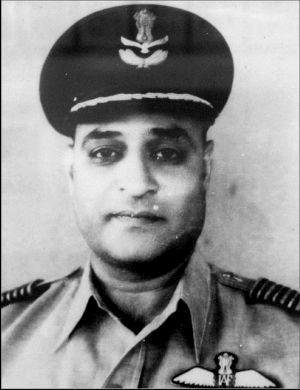 Air Commodore Madhukar Laxman Akut was commissioned in the Indian Air Force in November, 1941. During World War II he saw active service on the Burma Front. He held the important appointments in Air Headquarters as well as in the Command of Air Force Units. He served as an Instructor in a flying training school for training pilots and navigators. His professional knowledge and devotion to duty were instrumental in turning out batches of well trained pilots and navigators during those formative days of the Air Force. After his graduation in the Specialist Navigators' Course in the U.K., he was posted to a Bomber Squadron where he did commendable work in improving bombing techniques. During the Chinese aggression in 1962, in his capacity as Senior Officer-in-charge Administration in Headquarters, Eastern Air Command, he did excellent work in establishing not only the Command Headquarters, but also in setting up promptly many operational stations in the eastern sector. As Director Policy and Plans at Air Headquarters, he actively assisted in planning the expansion and consolidation of the Air Force. | ||||
| Reference: | Gazette of India Notification Dated : 26 Jan 1968 Number: | ||||
| AVM | Charan Das Guru Devasher 1867 GD(P) | Unit : -N.A.- | Award Date 26 Jan 68 | Announced 26 Jan 68 | |
| Details : | 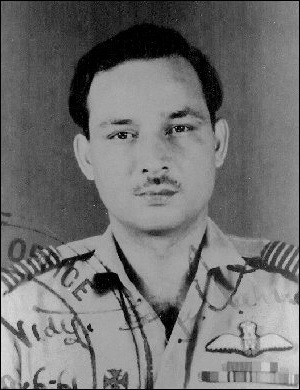 Air Commodore Charandas Gurudas Devasher was commissioned in 1942. He attended a Junior Commanders' Course at No. 1 Ground Training School and also a Staff Course at Defence Services Staff College, Wellington in 1950-51. He assumed the Command of an Air Defence Control Centre at a critical time during the IndiaÂPakistan conflict of 1965. Under his able guidance the Air Defence proved a well balanced force. After the cessation of hostilities, he with foresight, imagination, administrative and operational guidance, consolidated the Air Defence structure in the area under his Command. He made use of the available resources to the maximum and with utmost economy to meet the requirements of air defence. | ||||
| Reference: | Gazette of India Notification Dated : 26 Jan 1968 Number: | ||||
| AVM | Syed Abbas Hussain 1706 F(P) | Unit : -N.A.- | Award Date 26 Jan 69 | Announced 26 Jan 69 | |
| Details : |  Air Vice Marshal Syed Abbas Hussain was commissioned in the Air Force in 1941. He saw active service during World War II. He attended Frontier Warfare Course, Flying Instructors Course, Junior Commanders Course and Defence Services Staff College Course. He also attended Imperial Defence College Course in the UK. He has held the appointments of Chief Instructor at the Indian Air Force Academy, Chief Instructor, Air Wing, Defence Services Staff College, Director Training at Air Headquarters. In the field of flying training, the officer's achievements have been most commendable. While in command, he ensured operational efficiency of the Hunter Squadrons in a record time. It was under his guidance that the first 'Hunter Aerobatic Team' was formed, trained and perfected to win the laurels it did. As Commander of an operational base from 1966 to April 1968, he earned the reputation of a mature planner in the Indian Air Force. In his present appointment as Director of Operations, he has displayed outstanding professional knowledge and administrative ability. | ||||
| Reference: | Gazette of India Notification Dated : 26 Jan 1969 Number: | ||||
| Air Cmde | Anand Ramdas Pandit 1707 F(P) | Unit : Eastern Air Command | Award Date 26 Jan 69 | Announced 26 Jan 69 | |
| Details : | 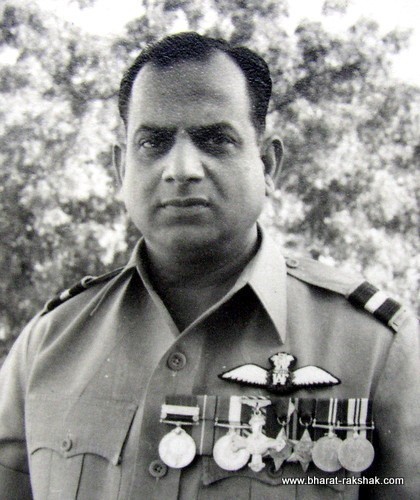 Air Commodore Anand Ramdas Pandit was commissioned in the Indian Air Force in 1941. He saw active service during World War II and was awarded Distinguished Flying Cross. He attended Defence Services Staff College in 1951-52, Indoctrination Course at Air Force School of Aviation Medicine in 1958 and the National Defence College Course in 1962-63. He has held various staff and command appointments While commanding an IAF Squadron, he has flown various types of aircraft and has varied flying experience. Subsequently, he was appointed Chief Instructor at the Jet Training Wing, and in this capacity, he successfully trained a large number of jet pilots. From 1963 to 1966, as the Senior Air Staff Officer of the Eastern Air Command, he was instrumental in swiftly achieving the targets of air maintenance task for the Command. The high standard of instructional level at the School of Land Air Warfare is largely the result of the improvements effected in the syllabus by this officer in 1967. | ||||
| Reference: | Gazette of India Notification Dated : 26 Jan 1969 Number: | ||||
| Air Cmde | Sarosh Jehangir Dastur 1792 F(P) | Unit : -N.A.- | Award Date 26 Jan 69 | Announced 26 Jan 69 | |
| Details : | 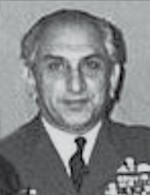 Air Commodore Sarosh Jahangir Dastur was commissioned in the Indian Air Force in 1942. He saw active service during World War II. He attended Defence Services Staff College Course in 1954-55, and Imperial Defence College Course in 1968. He has held various staff and command appointments. As Officer Commanding of an Air Force Station during 1952-54, he distinguished himself by tackling and solving several intricate administrative problems of the unit. Later, as Chief Instructor in the Air Wing of the Defence Services Staff College, he brought about improvements in methods and syllabus and made the training of Air Wing Officers purposeful. During the Goa operations, as Officer Commanding, Air Force Station, Poona, he was responsible for organising the Air Task Force in his sector. He activated additional early warning stations from the meagre resources at his command. As Director of Guided Weapons at Air Headquarters his work was of a very high order. | ||||
| Reference: | Gazette of India Notification Dated : 26 Jan 1969 Number: | ||||
| Air Cmde | Tapeswar Basu 1797 F(N) | Unit : -N.A.- | Award Date 26 Jan 69 | Announced 26 Jan 69 | |
| Details : | 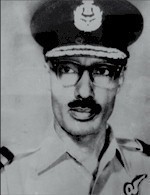 Air Commodore Tapeswar Basu was commissioned in the Indian Air Force in 1942. He saw active service in Burma during World War II. He attended Staff College Course at Wellington, Air Command and Staff Course in the USA and Advanced Air Navigation Course, Air Defence Course and Transport Support Course in the U. K. He accomplished the task of setting up instructional institutions connected with Navigator's training and Junior Commander's Course creditably He was given the task of establishing a staff course for the Indonesian Air Force at D'Jakarta where he earned admiration and affection of the Indonesian Air Force and thus established goodwill between the two countries. During the India-Pakistan conflict, as Senior Officer-inCharge, Administration, Headquarters Central Air Command, he maintained control over the available resources and was able to formulate and re-adjust administrative plans as demanded by changing operational requirements. | ||||
| Reference: | Gazette of India Notification Dated : 26 Jan 1969 Number: | ||||
| Air Cmde | Hemonto Kumar Bose 2348 F(P) | Unit : -N.A.- | Award Date 26 Jan 69 | Announced 26 Jan 69 | |
| Details : | 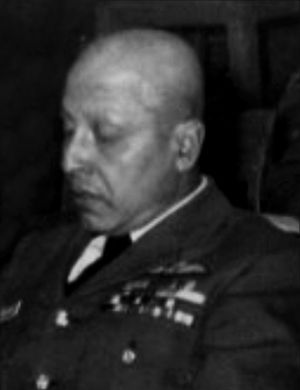 Air Commodore Hemonto Kumar Bose was commissioned in the Indian Air Force in 1943 He saw active service during World War II. He attended Defence Services Staff College Course in 1955-56 and the National Defence College Course in 1966. He has held various staff and command appointments. He has been known for his dash as a flier, and for his initiative and thoroughness right from his early days. While in command of a Fighter Squadron he was responsible for bringing the squadron to the highest level. His pioneer efforts in establishing the Headquarters of a newly established Wing and other allied services proved to be of immense help during the Chinese aggression in 1962. He has rendered distinguished service as Director of Personnel (Officers) and Director of Intelligence at Air Headquarters. | ||||
| Reference: | Gazette of India Notification Dated : 26 Jan 1969 Number: | ||||
| Air Cmde | Thirumalai Srinivasan 2416 AEL | Unit : -N.A.- | Award Date 26 Jan 69 | Announced 26 Jan 69 | |
| Details : | Air Commodore Thirumalai Srinivasan was commissioned in the Technical Signals Branch of the Indian Air Force in 1943 He saw active service during World War II. He attended Signals Officer's Radar Course in the U.K. in 1948, Methods of Instructions Course at No. 2 G.T.S. in 1949 and Junior Commander's Course in 1953. He has held various staff and command appointments creditably. During his tenure as Director of Signals, he contributed most effectively to all the major plans in the Directorate. In addition, he was responsible for installation and check up of a variety of sophisticated and modern ground and airborne electronics equipment in the Air Force. His successful handling of the task of development of sophisticated and complex airborne electronics equipment and completion of the prototype models of equipment which have been airÂtested is a real breakthrough in the field of indigenous development and production of sophisticated and specialised airborne electronics equipment in the country. | ||||
| Reference: | Gazette of India Notification Dated : 26 Jan 1969 Number: | ||||
| Gp Capt | Sita Ram Mullick 2654 A&SD | Unit : -N.A.- | Award Date 26 Jan 69 | Announced 26 Jan 69 | |
| Details : | 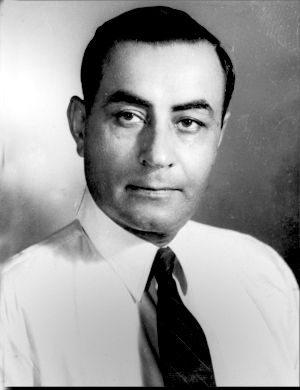 Group Captain Sita Ram Mallick was commissioned in the Administrative and Special Duties Branch of the Indian Air Force in 1943. During World War II, he served in Burma as an officer of the Public Relations Directorate of the then General Headquarters. After qualifying as a paratrooper in 1945, he went to Japan with the British occupation forces for public relations duties. In both these assignments, he acquitted himself creditably. He has served in all theatres of operations in India since Independence, and also abroad and provided public relations cover to the forces. As Chief Public Relations Officer of the Indian forces serving with the United Nations in the Congo, he rendered commendable service. He was a member of the team detailed for photographing Mount Everest in 1953, soon after the first ascent of the Everest, and again in 1965 following the Indian Expedition's success in sending nine members to the top. He was also responsible for providing Press coverage for this Expedition. In his appointment as Deputy Director in the Directorate of Public Relations (Defence), he also rendered distinguished service. | ||||
| Reference: | Gazette of India Notification Dated : 26 Jan 1969 Number: | ||||
| Gp Capt | Agia Kar Singh Bakshi 2013 A&SD | Unit : -N.A.- | Award Date 26 Jan 70 | Announced 26 Jan 70 | |
| Details : | 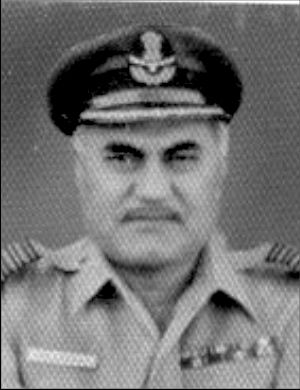 Group Captain Agia Kar Singh Bakshi joined the Indian Air Force in 1942. He has held a variety of appointments where he has performed his duties very creditably. He saw active service during World War II. He attended the Administrative Course and Air Traffic Control Course. He also attended Joint Air Traffic Officer (Advanced) Course in the United Kingdom. In 1966, as Senior Officer 1/c Administration, Headquarters Training Command Group, he rendered commendable service. He took keen interest in the welfare of all personnel in the matter of accommodation, messing, sports and other facilities. He displayed professional skill in planning the shifting of a Transport Training Wing, Navigation and Signals School and an Air Force Hospital to their new locations without interruption in their training and other commitments. He has recently taken over the command of the Air Force Administrative College. | ||||
| Reference: | Gazette of India Notification Dated : 26 Jan 1970 Number: | ||||
| Gp Capt | Randhir Singh 2135 GD(P) | Unit : -N.A.- | Award Date 26 Jan 70 | Announced 26 Jan 70 | |
| Details : | 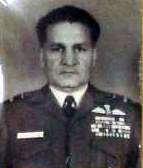 Group Captain Randhir Singh was commissioned in the Indian Air Force in 1942. He saw active service during World War II. He has held various staff and command appointments. He attended Fighter Controllers Course and Ground Attack Course on Canberra in the U.K. He also attended the Indoctrination Course in Aviation Medicine. He has commanded many operational Squadrons and an operational station with distinction. He has flown a variety of modern aircraft. In 1951, he did creditable work by bringing a Squadron from number plate basis to fully operational status in a short time. Again, in 1959, he took over the command of another important flying Squadron and developed it into an effective unit within a brief spell. He himself flew numerous sorties with commendable results until the end of the Chinese aggression. During the 1965 conflict with Pakistan, with complete disregard to personal comforts, he successfully directed the air defence operations within his area of responsibility. | ||||
| Reference: | Gazette of India Notification Dated : 26 Jan 1970 Number: | ||||
| Gp Capt | Brian Keith Stidston 2821 GD(P) | Unit : -N.A.- | Award Date 26 Jan 70 | Announced 26 Jan 70 | |
| Details : | 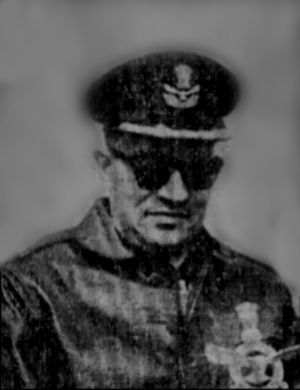 Air Commodore Brian Keith Stidston was commissioned in the Indian Air Force in 1944. He saw active service during World War II. He has held various command and staff appointments with distinction. He attended All Purposes Flying Instructors Course in the U.K., the Armament Training Course and the Indoctrination Course of Aviation Medicine. He has been commanding an operational flying station for over two years. Earlier, he commanded a Tactical Air Centre in an operational area. In both these assignments, he ensured a high standard of operational readiness and has creditably fulfilled all commitments assigned to him despite difficult terrain and weather conditions. His contribution in evaluation trials of various types of aircraft has been significant. He has brought about vital improvements in various airfield aids and facilities which have led to higher operational efficiency of the stations and units. | ||||
| Reference: | Gazette of India Notification Dated : 26 Jan 1970 Number: | ||||
| Gp Capt | Lakshman Mohan Katre 3117 GD(P) | Unit : -N.A.- | Award Date 26 Jan 70 | Announced 26 Jan 70 | |
| Details : | 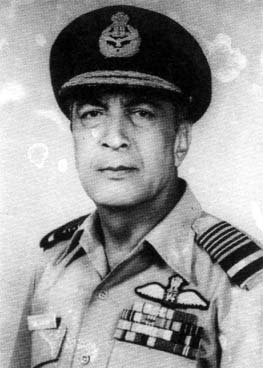 Group Captain Lakshman Madhav Katre was commissioned in the Indian Air Force in 1945. He has held various staff and command appointments with distinction. He attended the Flying Instructors Course in the United Kingdom. He also attended Junior Com manders' Course, Defence Services Staff Col lege Course and Armament Training Course. While commanding an operational flying Station during the period 1966-68, he displayed outstanding qualities of leadership and manÂmanagement and brought the station to operational readiness in a very short time. With his initiative and local improvisation he also developed an effective system for protecting his station and this system was adopted by other operational stations also. During the unprecedented floods in North Bengal, Sikkim and Bhutan area in October 1968, Group Captain Katre was appointed the local commander for Air Force Flood Relief work, and in this capacity he discharged his duties most creditably. | ||||
| Reference: | Gazette of India Notification Dated : 26 Jan 1970 Number: | ||||
| Gp Capt | Nittript Lal Badhwar 3955 GD(P) | Unit : -N.A.- | Award Date 26 Jan 70 | Announced 26 Jan 70 | |
| Details : |  Group Captain Nittript Lal Badhwar was commissioned in the Indian Air Force in 1950. He has held various staff and command appointments with distinction. He attended the Defence Services Staff College Course in 1963. He commanded a heavy transport squadron with distinction and in that capacity was largely responsible for establishing suitable procedures for the operation of such aircraft over high mountain ranges. He has served as Air Adviser to the High Commissioner of India in Pakistan. In this assignment, he rendered distinguished service as Air Adviser to the High Commission, he rendered distinguished service of an exceptional order in that he helped the Indian Air Force to sort out a number of problems. | ||||
| Reference: | Gazette of India Notification Dated : 26 Jan 1970 Number: | ||||
| ACmde | Sat Pal Singh 2853 AEL | Unit : -N.A.- | Award Date 26 Jan 70 | Announced 26 Jan 70 | |
| Details : |  Air Commodore Satpal Singh was commissioned in the Indian Air Force in 1944. He has held various appointments such as Deputy Air Adviser (Technical) in U.K. Deputy Director of Guided Weapons at Air Headquarters and Secretary, Nanda Committee on Trade Structure. He attended Signal Officer Course and Special Communication Course in the United Kingdom. He also attended the Defence Services Staff College Course and the National Defence College Course. He was posted as the Command Signals Officer at Headquarters, Western Air Command, in January 1965, where he helped to improve the operational preparedness of the command in the fields of signals and electronics. With his organising ability and professional skill, he has been able to meet the demands of operational communication in the Western Air Command. | ||||
| Reference: | Gazette of India Notification Dated : 26 Jan 1970 Number: | ||||
| Air Cmde | Idandas Werhoma Sabhaney 2607 AEM | Unit : -N.A.- | Award Date 26 Jan 71 | Announced 26 Jan 71 | |
| Details : |  Air Commodore Idandas Werhomal Sabhaney was commissioned in the Indian Air Force in 1943. He has held various important staff and command appointments with distinction. He attended Signals Officers Radar Course in the U.K. in 1949 and also the National Defence College Course in 1966-67. He has been the Senior Technical Staff Officer at a Command Headquarters since April 1968. He has evolved and introduced a form of production planning and control suited to Air Force conditions. This technique has brought about considerable improvement in the output of the Base Repair Depots. | ||||
| Reference: | Gazette of India Notification Dated : 26 Jan 1971 Number: | ||||
| Gp Capt | Jemji Hormusji Framji Maneckshaw 2690 MED | Unit : -N.A.- | Award Date 26 Jan 71 | Announced 26 Jan 71 | |
| Details : | 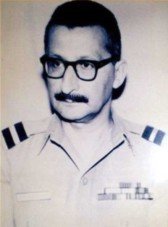 Group Captain Jemi Hormusji Framji Manekshaw was commissioned in the Army Medical Corps in February 1943 and was seconded to the Indian Air Force in July the same year. He saw active service during World War II. He attended the Advance Aviation Medicine Course in the USA in 1948-49. He has held with distinction various medical assignments at operational units, wings and stations. He was the Senior Medical Officer of an Operational Group of the Indian Air Force. In this appointment, he organised the air transportation of sick and wounded during the 1947-48 operations in Jammu and Kashmir. As Deputy Air Adviser (Medicine) in the High Commission of India in the UK from 1961 to 1964, he contributed a great deal towards resolving Aero Medical problems which were being encountered for the first time in the Indian Air Force due to induction of high performance aircraft in the service. He has been commanding the Institute of Aviation Medicine for the past three years. In this capacity, he has been instrumental in introducing modern research and evaluation techniques which are of significant value towards advancement of the Science of Aviation Medicine in the Indian Air Force. He is Senior Advisor in Aviation Medicine in the Indian Air Force, and is also Adviser to Bangalore University on matters pertaining to Aviation Medicine. | ||||
| Reference: | Gazette of India Notification Dated : 26 Jan 1971 Number: | ||||
| Air Cmde | Dilbagh Singh 2998 GD(P) | Unit : -N.A.- | Award Date 26 Jan 71 | Announced 26 Jan 71 | |
| Details : | 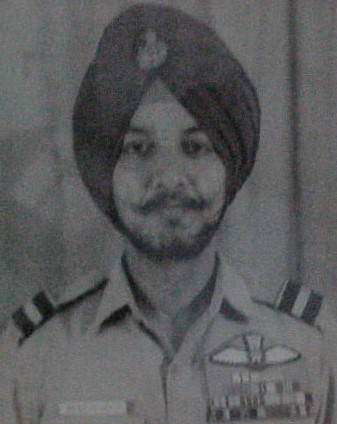 Group Captain (now Air Commodore) Dilbagh Singh was commissioned in the Indian Air Force in September 1944. He attended Day Fighter's Leader's Course and RAF Staff College Course in the U.K. He has commanded operational units with distinction and has also held important staff and training appointments. While commanding an operational Flying Station from 1966 to 1969, he displayed outstanding qualities of leadership and also administrative and organising ability. Again, recently while holding an Air Staff appointment at an Operational Command Headquarters he successfully planned and conducted operational exercises. His unremitting efforts, initiative and zeal have contributed greatly towards achieving a high state of training and combat effectiveness of a Fighter Squadrons in the Command. | ||||
| Reference: | Gazette of India Notification Dated : 26 Jan 1971 Number: | ||||
| Gp Capt | Douglas George King-Lee 3040 GD(P) | Unit : -N.A.- | Award Date 26 Jan 71 | Announced 26 Jan 71 | |
| Details : | 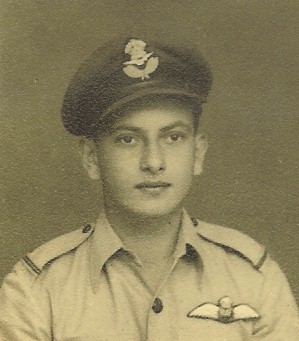 Group Captain Douglas George KingÂLee was commissioned in the Indian Air Force in November 1944. He saw active service during World War II. He attended the All Purpose Flying Instructors' Course in the U.K. in 1947. He also attended Defence Services Staff College Course in 1965, Senior Officers Study Course at Joint Air Warfare School and Senior Officers Aviation Medicine Course in 1968. He has served with distinction in a number of operational and training units and has held important staff appointments at Air Headquarters and at Headquarters Training Command. In 1963, while commanding an operational Wing, he did creditable work. In November 1968, he took over the command of a Base Repair Depot. In this assignment, despite many difficulties, he has been able to increase the production of aircrafts. | ||||
| Reference: | Gazette of India Notification Dated : 26 Jan 1971 Number: | ||||
| Air Cmde | Dina Nath Maniktala 3434 MED | Unit : -N.A.- | Award Date 26 Jan 71 | Announced 26 Jan 71 | |
| Details : | 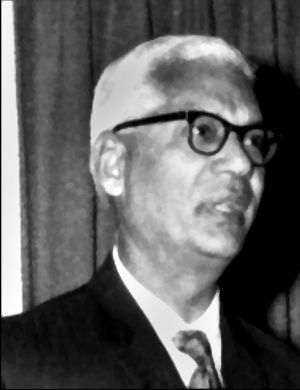 Group Captain (now Air Commodore) Dina Nath Maniktala was commissioned in the Indian Air Force in 1942. He saw active service during World War II. He attended the Defence Services Staff College Course in 1954-55. He has held various important staff and command appointments. He has commanded certain Air Force Hospitals and has been the President of the Air Force Central Medical Establishment and the Principal Medical Officer at the Headquarters of all the Air Force Commands at different times. He has also served in the Directorate of Technical Development and Production (Air). He AVSM 1971-72 has reÂvitalised the medical organisation of the Command in which he is now serving as Principal Medical Officer. One of his significant attainments is the practical application of his knowledge of Aviation Medicine to the care of aircrew. | ||||
| Reference: | Gazette of India Notification Dated : 26 Jan 1971 Number: | ||||
| Gp Capt | Ramesh Chandra Jain 3546 AEL | Unit : -N.A.- | Award Date 26 Jan 71 | Announced 26 Jan 71 | |
| Details : | Group Captain Ramesh Chander Jain was commissioned in the Aeronautical Engineering (Signals) Branch of the Indian Air Force in December, 1948. He took over command of a Signals Unit in November 1969. Certain special tasks in specialized and sophisticated electronics field were entrusted to his unit. Not only did he develop sophisticated electronic equipment, which were urgently required, he undertook and successfully completed production of sufficient quantity of these items within a very short period even though the resources of the unit in equipment, spears and personnel were extremely limited. He guided his unit urgent operational requirements. His efforts built up and established a sophisticated electronic field which helped the Air Force in the recent operations against Pakistan. Group Captain Ramesh Chander Jain thus rendered distinguished service of an exceptional order. | ||||
| Reference: | Gazette of India Notification Dated : 26 Jan 1971 Number: | ||||
| Gp Capt | Reginald John Manuel Upot 3599 GD(P) | Unit : -N.A.- | Award Date 26 Jan 71 | Announced 26 Jan 71 | |
| Details : | 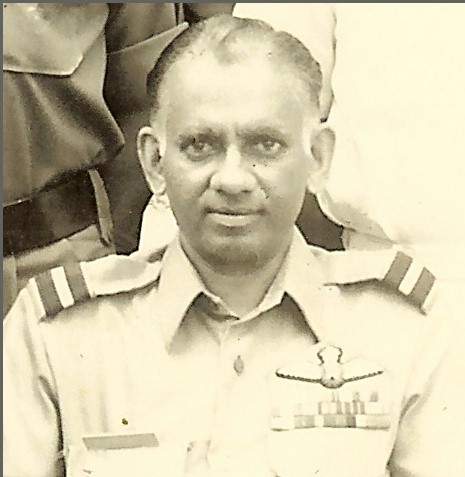 Group Captain Reginald John Manual Upot was commissioned in the Indian Air Force in July 1949. He attended the Flying Instructors Course in 1950-51, Method of Instruction Course in 1951, Defence Service Staff College Course in 1962-63 and Senior Officers Study Course in 1970. After serving with a number of Squadrons, he became a flying instructor and worked in that capacity for a number of years. He holds the highest Flying Instructor's Category and also the highest instrument rating. He has been responsible for the completion of summer trials of a new type of aircraft. | ||||
| Reference: | Gazette of India Notification Dated : 26 Jan 1971 Number: | ||||
